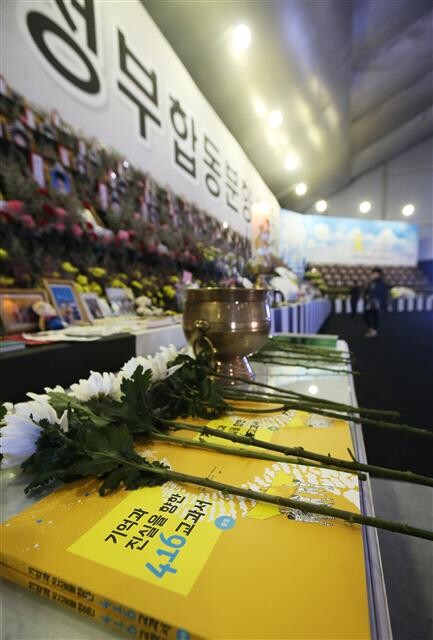hankyoreh
Links to other country sites 다른 나라 사이트 링크
Ministry of Education bans use of “Sewol Textbooks” for sinking’s second anniversary

The Ministry of Education banned the use of “Sewol textbooks” published by the Korean Teachers’ and Education Workers’ Union (KTU) for the second anniversary of the Sewol ferry sinking (Apr. 16), citing “concerns about negative effects in shaping students’ healthy views on their country.”
On Mar. 25, the ministry announced that an examination of KTU’s April 16 Textbook for Memory and Truth by current and former teachers and related government agencies had found it “unsuitable as educational material.”
“We have sent notices to metropolitan and provincial offices of education informing them that the textbooks’ use is banned in schools,” it said.
KTU published the textbooks on Mar. 21 as references for teachers to use in “opportunity lessons related to the Apr. 2014 ferry sinking, which claimed over 300 lives.
“The first step in educational practice in response to the Sewol tragedy is to remember the Sewol incident itself,” the union said at the time. The term “opportunity lesson” is used to describe classes on freely chosen topics that are used to help students develop a proper understanding of social issues not included in the formal curriculum.
According to the ministry, examination of the Sewol materials for elementary and middle school students showed nine examples of “unsuitable material” in the former and eight in the latter. Specifically, it cited three problem areas: “concerns about fostering a negative view of the country,” “inappropriateness as educational material,” and “distortion of facts.”
In particular, the ministry cited content in “Queen of the Smile” from “Sewol Story,” a collection of reminiscences on the sinking by 65 children’s poets, writers, and illustrators for elementary students published in Sept. 2014 by Byeolsup.
“By encouraging students to think of their President through the depiction of the queen in the story, it fosters a negative image of the President and administration,” it said of the content.
The ministry also took issue with the inclusion of a photograph in the middle school material with the caption “President Park Geun-hye ignores grieving family members appealing to the National Assembly for an investigation.”
“The decontextualized presentation of the scene in the photograph was deemed to be a distortion of the overall circumstances aimed to encourage students to distrust their government,” it said.
In response, KTU spokesperson Song Jae-hyeok compared the ministry’s criticisms to “taking excerpts about North Korea’s juche ideology from an authorized textbook and claiming that the entire textbook whitewashes North Korea.”
“They’re ignoring the aim of commemorating and remembering the Sewol and focusing instead of nitpicking about incidental things,” Song said.
By Jin Myeong-seon, staff reporter
Please direct questions or comments to [english@hani.co.kr]

Editorial・opinion
![[Column] Season 2 of special prosecutor probe may be coming to Korea soon [Column] Season 2 of special prosecutor probe may be coming to Korea soon](https://flexible.img.hani.co.kr/flexible/normal/500/300/imgdb/original/2024/0426/3317141030699447.jpg) [Column] Season 2 of special prosecutor probe may be coming to Korea soon
[Column] Season 2 of special prosecutor probe may be coming to Korea soon![[Column] Park Geun-hye déjà vu in Yoon Suk-yeol [Column] Park Geun-hye déjà vu in Yoon Suk-yeol](https://flexible.img.hani.co.kr/flexible/normal/500/300/imgdb/original/2024/0424/651713945113788.jpg) [Column] Park Geun-hye déjà vu in Yoon Suk-yeol
[Column] Park Geun-hye déjà vu in Yoon Suk-yeol- [Editorial] New weight of N. Korea’s nuclear threats makes dialogue all the more urgent
- [Guest essay] The real reason Korea’s new right wants to dub Rhee a founding father
- [Column] ‘Choson’: Is it time we start referring to N. Korea in its own terms?
- [Editorial] Japan’s rewriting of history with Korea has gone too far
- [Column] The president’s questionable capacity for dialogue
- [Column] Are chaebol firms just pizza pies for families to divvy up as they please?
- [Column] Has Korea, too, crossed the Rubicon on China?
- [Correspondent’s column] In Japan’s alliance with US, echoes of its past alliances with UK
Most viewed articles
- 1[Column] Season 2 of special prosecutor probe may be coming to Korea soon
- 2‘We must say no’: Seoul defense chief on Korean, USFK involvement in hypothetical Taiwan crisis
- 3Division commander ordered troops to enter raging flood waters before Marine died, survivor says
- 4Is N. Korea threatening to test nukes in response to possible new US-led sanctions body?
- 5Is Japan about to snatch control of Line messenger from Korea’s Naver?
- 6No good, very bad game for Korea puts it out of Olympics for first time since 1988
- 7[Editorial] Korea’s surprise Q1 growth requires objective assessment, not blind fanfare
- 8Korea’s 1.3% growth in Q1 signals ‘textbook’ return to growth, says government
- 9N. Korean delegation’s trip to Iran shows how Pyongyang is leveraging ties with Moscow
- 10Amnesty notes ‘erosion’ of freedom of expression in Korea in annual human rights report